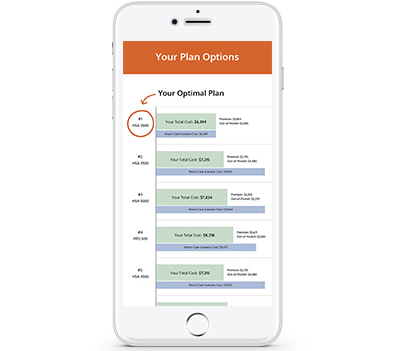
When your employees understand their health benefits, they can spend less to get more out of their plans. However, only 19% of employers feel their employees have a good grasp on their benefits. This can lead to inefficient use of benefits, from expensive, unnecessary emergency room visits to choosing higher-cost providers.
For 50 years, Harvard Pilgrim has been helping employers control their health care costs. By providing employees with the support and education to clear up costly misconceptions, we help them use their health plans efficiently. And when they save, you save.
 Mistake 1
Mistake 1
Choosing a plan based solely on the deductible
The truth
Evaluating all cost-sharing options can help control costs for both employees and employers.
A tiered plan may offer ways to pay less out of pocket for high-quality providers.
Plans with coinsurance have the insured pay a percentage of the medical charge, which may, in some cases, be less than a co-pay.
Our solution
 Harvard Pilgrim offers a decision-making program that helps employees choose the most cost-efficient plan by helping them understand their expected plan usage and medical expenses for the coming year. Our staff can also come on site to help your employees understand how to choose the best plan for them. When members understand options like co-pays and coinsurance, they can save throughout the year.
Harvard Pilgrim offers a decision-making program that helps employees choose the most cost-efficient plan by helping them understand their expected plan usage and medical expenses for the coming year. Our staff can also come on site to help your employees understand how to choose the best plan for them. When members understand options like co-pays and coinsurance, they can save throughout the year.
Only 9% of Americans showed an understanding of health plan premium, deductible, out-of-pocket maximum, and coinsurance. (1)
 Mistake 2
Mistake 2
Assuming that a higher-deductible plan means higher costs
The truth
Higher-deductible plans often have lower premiums, which can help save money in the long run.
These plans can also encourage employees to shop around and choose the most affordable care.
This gives them a better understanding of how to get the most value from their plan.
 Our solution
Our solution
Harvard Pilgrim offers both HSAs (Health Savings Accounts) and HRAs (Health Reimbursement Accounts) to support your employees who’ve selected a higher-deductible plan. Each can be an attractive medical expense fund option for employees who want lower premiums but are worried about unexpected out-of-pocket costs.
Our cost comparison tool allows members to estimate their out-of-pocket costs for hundreds of services and procedures and make more informed decisions about where they go for care.
 Mistake 3
Mistake 3
Choosing a more expensive provider in hopes of getting better care
The truth
The old adage “You get what you pay for” may apply to concert tickets or a new roof, but it doesn’t necessarily apply to health care.
There can be a significant difference in cost but not necessarily in quality of care for services like:
- Lab work
- Screenings
- Outpatient surgery
Our solution
 Many of our plan designs are structured to drive toward quality services that have a lower out-of-pocket cost for members. We offer different network options and site-of-service benefits, such as our LP (Low-cost Provider) network in New Hampshire and the Flex benefit in Massachusetts.
Many of our plan designs are structured to drive toward quality services that have a lower out-of-pocket cost for members. We offer different network options and site-of-service benefits, such as our LP (Low-cost Provider) network in New Hampshire and the Flex benefit in Massachusetts.
 Mistake 4
Mistake 4
Going straight to the ER when the doctor isn’t available
The truth
Options such as urgent care or even virtual doctor visits can help your employees get the quality care they need, without the high cost of an emergency room visit.
Our solution
We offer your employees tools and support to find the level of care they need. To help them avoid costly and unnecessary ER visits, our plans cover multiple urgent care options, including a telemedicine service. Members can get fast and affordable urgent care by connecting with a doctor through a live video visit on their smartphones, tablets, or computers.
 Emergency room visits can cost three times more than urgent care visits.
Emergency room visits can cost three times more than urgent care visits.
 56% of emergency room visits are “totally avoidable.”3
56% of emergency room visits are “totally avoidable.”3
Use these solutions to keep costs down all around.
By helping our members avoid these mistakes, Harvard Pilgrim is helping employers across New England save. And with a wide range of coverage options at multiple cost structures, we can help you find the right solutions at the right price.
See what we can do for you. Contact your broker and ask about Harvard Pilgrim today.
1. Masterson L. UnitedHealth survey: Most Americans don’t understand basic health plan terms. Healthcare Dive. October 10, 2017. https://www.healthcaredive.com/news/unitedhealth-survey-most-americans-dont-under¬stand-basic-health-plan-term/506895/.